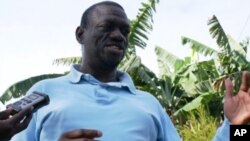Uganda’s police briefly arrested a prominent opposition activist, Kizza Besigye, and have since restricted his movements, according to deputy police spokesman Patrick Onyango.
Onyango said police took the opposition leader into custody briefly to prevent him from plunging the country in chaos. He said the restrictions on Besigye’s movements applied especially in the business district of the capital, Kampala.
“We received intelligence information that he was planning to go to Kampala city to incite people to violence,” said Onyango. “He wanted to incite the traders to cause more violence, to disrupt the peace that was in the city. So we had to come because he was planning to go and commit a crime in the city.”
But opposition groups say Besigye wanted to show solidarity with striking business owners in Kampala. The business owners closed their shops Tuesday to protest against a new government tax increase on imported goods.
The government contends that granting Besigye access to the Kampala business areas would create chaos and destabilize the country.
Besigye has so far been prevented from leaving his Kasangati home, which is in a Kampala suburb. The police did not immediately press charges against him following his brief detention.
Onyango said police informed the opposition leader that he is free to travel to any part of the country, except the downtown Kampala business districts.
“What we want is for him to notify us of his intention and what he plans to do. He can move throughout Uganda, but when we detect that he is planning to cause chaos in the city, we shall not allow him to move,” said Onyango.
Supporters of the opposition leader say his arrest and the subsequent restriction on his movements violate Uganda’s constitution, which they contend guarantees freedom of movement, assembly and expression. Onyango denies the police violated the constitution.
“The same constitution gives us powers to detect and prevent crime. So when we have detected that there is a crime going to be committed we have to come in to prevent crime from happening,” said Onyango.
The opposition groups say the police have often used violence to suppress their demonstrations demanding improved living conditions. Onyango disagreed, saying the opposition refuses to follow procedure to inform the police about their protests.
“We do not [prevent] people from participating in demonstrations. But normally, the opposition tries to forcefully do things without consulting us,” said Onyango. “We have not used excessive force on them. It is they who use force to do things and we only come in to put things in order.”
Onyango said police took the opposition leader into custody briefly to prevent him from plunging the country in chaos. He said the restrictions on Besigye’s movements applied especially in the business district of the capital, Kampala.
“We received intelligence information that he was planning to go to Kampala city to incite people to violence,” said Onyango. “He wanted to incite the traders to cause more violence, to disrupt the peace that was in the city. So we had to come because he was planning to go and commit a crime in the city.”
But opposition groups say Besigye wanted to show solidarity with striking business owners in Kampala. The business owners closed their shops Tuesday to protest against a new government tax increase on imported goods.
The government contends that granting Besigye access to the Kampala business areas would create chaos and destabilize the country.
Besigye has so far been prevented from leaving his Kasangati home, which is in a Kampala suburb. The police did not immediately press charges against him following his brief detention.
Onyango said police informed the opposition leader that he is free to travel to any part of the country, except the downtown Kampala business districts.
“What we want is for him to notify us of his intention and what he plans to do. He can move throughout Uganda, but when we detect that he is planning to cause chaos in the city, we shall not allow him to move,” said Onyango.
Supporters of the opposition leader say his arrest and the subsequent restriction on his movements violate Uganda’s constitution, which they contend guarantees freedom of movement, assembly and expression. Onyango denies the police violated the constitution.
“The same constitution gives us powers to detect and prevent crime. So when we have detected that there is a crime going to be committed we have to come in to prevent crime from happening,” said Onyango.
The opposition groups say the police have often used violence to suppress their demonstrations demanding improved living conditions. Onyango disagreed, saying the opposition refuses to follow procedure to inform the police about their protests.
“We do not [prevent] people from participating in demonstrations. But normally, the opposition tries to forcefully do things without consulting us,” said Onyango. “We have not used excessive force on them. It is they who use force to do things and we only come in to put things in order.”





